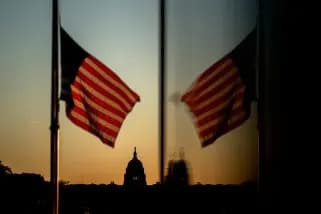Summary: Vice President JD Vance said he hopes his Hindu-born wife might one day be "moved by the Christian gospel," remarks that drew criticism in India and among the Indian diaspora for being insensitive to religious freedom and the subcontinent’s history with missionary activity. Vance clarified he supports his wife regardless of her faith; Usha Vance has said she does not plan to convert. The exchange reignited debates about faith, identity and politics, particularly as Vance’s national profile rises.
JD Vance’s Remarks on His Hindu Wife’s Faith Spark Backlash in India and the Diaspora

Vice President JD Vance’s recent comments that he hopes his wife, Usha Vance, might one day be “moved by the Christian gospel” have touched off a heated debate in India and among the Indian diaspora about religious freedom, cultural sensitivity and the role of faith in public life.
The comments were made during a Turning Point USA event at the University of Mississippi, where an audience member asked about the relationship between Christianity and American patriotism. In a wide-ranging reply that touched on immigration and family matters, Vance spoke about his interfaith marriage and his own religious journey.
“My wife did not grow up Christian. I think it’s fair to say she grew up in a Hindu family but not in a particularly religious family,”
Vance, who converted to Catholicism in 2019, added:
“Do I hope eventually that she is somehow moved by the same thing that I was moved by in church? I honestly do wish that because I believe in the Christian Gospel, and I hope eventually my wife comes to see it the same way.”
He later clarified in a now-deleted social media post that, as is common in many interfaith marriages, he hopes his spouse may one day share his faith but that he supports her regardless of her beliefs.
Usha Vance, raised in Southern California in a Hindu household, has previously said she does not intend to convert and stressed that their children are exposed to both Catholic and Hindu traditions. In an earlier interview she noted that while their children attend Catholic school, they will have the freedom to choose whether to be baptized.
Reactions and concerns
The remarks prompted swift reactions. Critics in India and among the diaspora described the comments as insensitive and argued they recalled a long history of Christian proselytizing that can feel coercive to many Hindus. Some called the language especially problematic at a time of heightened tensions over immigration and minority rights.
“It’s ridiculous and absolutely wrong,” said Kush Mehta of New Delhi, adding that people should be free to follow their own spiritual path without pressure. Other social media posts accused Vance of treating his wife’s Hindu background as a “problem to be fixed.”
Opinion writers and scholars noted broader political implications. Journalist Areena Arora wrote that when an elected official frames his faith as the ideal for everyone, the statement shifts from private to political. Scholar Chad Bauman observed that historical memories of colonial-era missionary activity make some Hindus wary of Christian evangelism, a sentiment that has grown among supporters of India’s ruling Bharatiya Janata Party and its Hindu nationalist rhetoric.
Some commentators also said the exchange reinforced a stereotype that the United States privileges Christianity over other faiths, which can undermine perceptions of American pluralism.
Mixed responses at home and abroad
Not all responses were negative. For some in India, Usha Vance’s visibility as a woman of Indian heritage in the U.S. administration was a point of pride. Others urged restraint in attacking the family, urging critics to focus on policy rather than personal matters.
Representative Ro Khanna, who is Hindu, called for criticism to be directed at policy, not at the vice president’s family. Meghan McCain praised Usha Vance as a unifying and warm figure within the administration.
Context and implications
India’s constitution enshrines freedom of religion, but the country’s modern politics includes contentious debates about conversion and laws in some states that restrict proselytizing. Critics argue that religious freedoms for non-Hindu communities have narrowed in recent years. Observers say Vance’s remarks tapped into those wider anxieties and the sensitive intersection of faith, identity and politics for immigrant communities.
Vance’s public profile has been rising amid speculation about his future political ambitions. His comments — and the reactions they inspired — underscore how personal remarks about faith can quickly become politically consequential in today’s polarized environment.
Several figures cited in reaction to the remarks include journalists Shubhangi Sharma and Priyanka Deo, scholar Chad Bauman, writer Ram Puniyani, and public voices such as Kush Mehta and Vanessa Almeida. Usha Vance has not issued a public response to the recent controversy.
Help us improve.


































